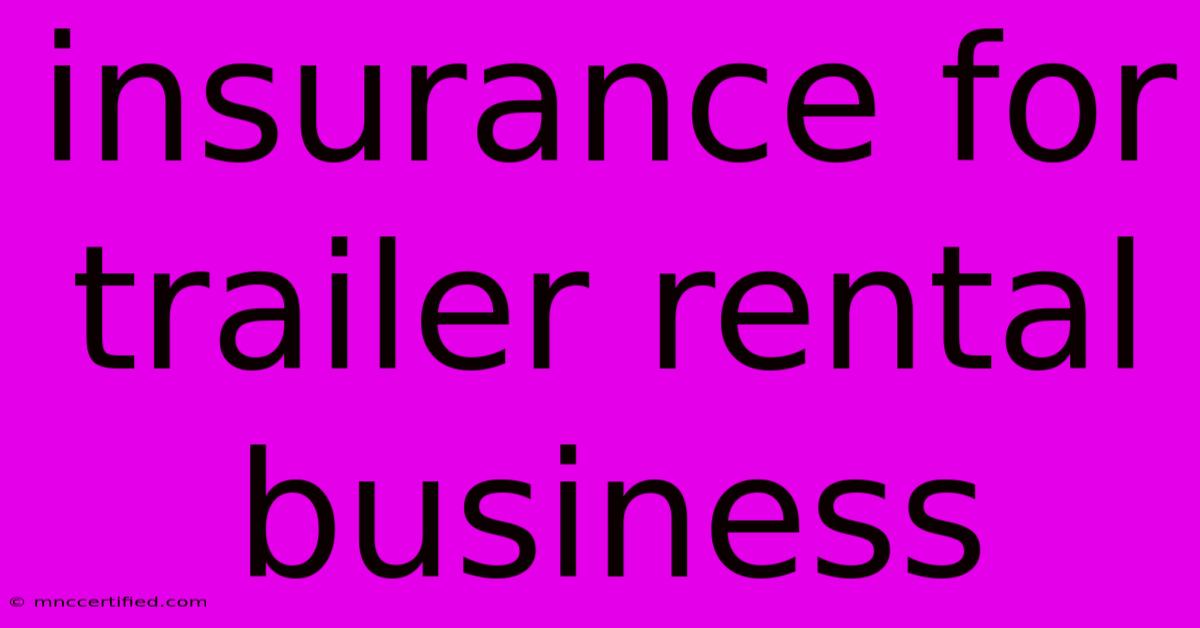Insurance For Trailer Rental Business

Table of Contents
Protecting Your Profits: Insurance for Trailer Rental Businesses
Owning a trailer rental business can be a lucrative venture, providing essential equipment for various needs. However, with the responsibility of renting out valuable assets comes the need for comprehensive insurance coverage. This article will delve into the essential insurance policies every trailer rental business should consider, explaining their importance and key features.
Why Insurance is Crucial for Your Trailer Rental Business
Imagine a scenario where a rented trailer is damaged in an accident, or a customer uses it for illegal activities. Without adequate insurance, you could face significant financial losses, legal battles, and potentially even damage to your business's reputation. Here's why insurance is paramount:
- Liability Coverage: Protects your business from lawsuits arising from injuries or property damage caused by a rented trailer, whether due to negligence or accidents.
- Property Damage Coverage: Insures the trailers themselves against damage or theft, covering repair or replacement costs.
- Rental Income Protection: Provides financial compensation if you can't rent out a trailer due to damage or loss, ensuring you don't lose income.
Essential Insurance Policies for Trailer Rental Businesses
1. Commercial General Liability (CGL) Insurance: This is a cornerstone of any trailer rental business. It offers protection against various liability risks, including:
- Bodily Injury: Covers medical expenses and legal costs if a customer or third party is injured while using a rented trailer.
- Property Damage: Pays for damage to other people's property caused by your rented trailers.
- Personal and Advertising Injury: Protects against claims of libel, slander, copyright infringement, or other similar incidents.
2. Commercial Auto Insurance: This policy is essential for vehicles that are used to transport trailers, including:
- Liability Coverage: Protects you if a company vehicle is involved in an accident that causes injury or property damage to others.
- Collision Coverage: Pays for repairs or replacement of your vehicle if it's damaged in a collision.
- Comprehensive Coverage: Covers damage to your vehicle from events like theft, fire, or natural disasters.
3. Trailer Specific Coverage: While CGL and commercial auto insurance provide a solid foundation, additional policies tailored to your business are crucial:
- Physical Damage Coverage: Covers repairs or replacement of rented trailers in case of accidents, vandalism, theft, or other incidents.
- Rental Income Coverage: Compensates you for lost income if a trailer is damaged and unavailable for rental.
- Excess Liability Coverage (Umbrella Policy): Provides additional protection beyond your CGL limits, offering peace of mind for high-value claims.
4. Workers' Compensation Insurance: If you employ drivers, mechanics, or other staff, this policy is mandatory in most states. It covers medical expenses and lost wages for employees injured on the job.
Choosing the Right Coverage and Provider
- Evaluate Your Needs: Determine the level of coverage you require based on your business size, trailer fleet value, and risk tolerance.
- Compare Policies: Get quotes from multiple insurance providers to compare coverage, premiums, and deductibles.
- Seek Expert Advice: Consult with an insurance broker specializing in commercial insurance to help you navigate the intricacies of policy options and find the best fit for your business.
Don't Neglect Your Insurance
Adequate insurance is essential for your trailer rental business's financial health and long-term success. It protects you from unforeseen circumstances, mitigating financial losses and safeguarding your future. By investing in the right insurance policies and working with a knowledgeable provider, you can focus on building a thriving and secure business.

Thank you for visiting our website wich cover about Insurance For Trailer Rental Business. We hope the information provided has been useful to you. Feel free to contact us if you have any questions or need further assistance. See you next time and dont miss to bookmark.
Featured Posts
-
Rutgers Vs Minnesota Live Stream Free 11 9 24
Nov 10, 2024
-
Bangladesh Defeats Afghanistan By 68 Runs
Nov 10, 2024
-
Exception To Title Insurance Coverage
Nov 10, 2024
-
Still Austin Red Corn Bottled In Bond
Nov 10, 2024
-
Insurance Companies In Casa Grande Az
Nov 10, 2024